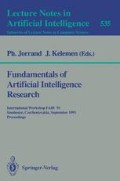Abstract
Abduction is often considered as inference to the best explanation. In this paper, we appeal to abduction as a way to generate all but only explanations that have “some reasonable prospect” of being valid.
We first provide a logical definition of abduction. We next study how abductive reasoning can be mechanized in propositional logic. We finally propose the generalization of this study to first-order logic and highlight main obstacles for mechanizing abduction in that frame.
Preview
Unable to display preview. Download preview PDF.
Bibliography
Allen, J.F. [1983]. «Maintaining Knowledge about Temporal Intervals», Communications of the Association for Computing Machinery 26, pp. 832–843.
Aristotle [?]. Organon III: les premiers analytiques, traduction et notes de J. Tricot, librairie philosophique J. Vrin, Paris, 1971.
Chang, C.L. and Lee, R.C.T. [1973]. Symbolic Logic and Mechanical Theorem Proving, Academic Press, New York.
Cox, P.T. and Pietrzykowski, T. [1984]. «A Complete, Nonredundant Algorithm for Reversed Skolemization», Theoretical Computer Science 28, pp. 239–261.
Cox, P.T. and Pietrzykowski, T. [1986]. «Causes for Events: Their Computation and Applications», Proc. International Conference on Automated Deduction, pp. 608–621.
Dowling, W.F. and Gallier, J.H. [1984]. «Linear-time Algorithms for Testing the Satisfiability of Propositional Horn Formulae», Journal of Logic Programming 3, pp. 267–284.
Dreben, B. and Goldfarb, W.D. [1979]. The Decision Problem: Solvable Classes of Quantificational Formulas, Addison-Wesley Publishing Company, Reading.
El Ayeb, B., Marquis, P. and Rusinowitch, M. [1990a]. «Deductive / Abductive Diagnosis: The DA-Principles», Proc. European Conference on Artificial Intelligence, pp. 47–52.
El Ayeb, B., Marquis, P. and Rusinowitch, M. [1990b]. «A New Diagnosis Approach by Deduction and Abduction», Proc. International Workshop on Expert Systems in Engineering, Lecture Notes in Artificial Intelligence 462, pp. 32–46.
Gallier, J.H. [1986]. Logic for Computer Science — Foundations of Automatic Theorem Proving, Harper & Row, New York.
Gottlob, G. [1987]. «Subsumption and Implication», Information Processing Letters 24, pp. 109–111.
Jackson, P. and Pais, J. [1990]. «Computing Prime Implicants», Proc. International Conference on Automated Deduction, Lecture Notes in Artificial Intelligence 449, pp. 543–557.
Kean, A. and Tsiknis, G. [1990]. «An Incremental Method for Generating Prime Implicants/Implicates», Journal of Symbolic Computation 9, pp. 185–206.
Kugel, P. [1977]. «Induction, Pure and Simple», Information and Control 35, pp. 276–336.
Kuntzmann, J. and Naslin, P. [1967]. Algèbre de Boole et machines logiques, Dunod, Paris.
Lee, R.C.T. [1967]. A Completeness Theorem and a Computer Program for Finding Theorems Derivable from Given Axioms, Ph.D. thesis, University of California.
Marquis, P. [1989]. «Computing Most Specific Generalisations in Propositional Calculus», Proc. European Working Session on Learning, pp. 135–138.
Marquis, P. [1991]. Contribution à l'étude des méthodes de construction d'hypothèses en intelligence artificielle, Ph.D. thesis, Université de Nancy I.
Mathieu, P. and Delahaye, J.P. [1990]. «The Logical Compilation of Knowledge Bases», Proc. European Workshop JELIA'90, Lecture Notes in Artificial Intelligence 478, pp. 386–398.
McDermott, D. [1982]. «A Temporal Logic for Reasoning About Processes and Plans», Cognitive Science 6, pp. 101–155.
Minicozzi, E. and Reiter, R. [1972]. «A Note on Linear Resolution Strategies in Consequence-Finding», Artificial Intelligence 3, pp. 175–180.
Morgan, C.G. [1971]. «Hypothesis Generation by Machine», Artificial Intelligence 2, pp. 179–187.
Morgan, C.G. [1975]. «Automated Hypothesis Generation Using Extended Inductive Resolution», Proc. International Joint Conference on Artificial Intelligence, pp. 351–356.
Peirce, C.S. [1931]. Collected Papers of Charles Sanders Peirce, vol. 2, C. Hartsthrone and P. Weiss (ed.), Harvard University Press, Cambridge.
Plotkin, G.D. [1971]. «A Further Note on Inductive Generalisation», Machine Intelligence 6, pp. 101–124.
Pople, H.E. Jr [1973]. «On the Mechanization of Abductive Logic», Proc. International Joint Conference on Artificial Intelligence, pp. 147–152.
Provan, G.M. [1990]. «The Computational Complexity of Multiple-Context Truth Maintenance Systems”, Proc. European Conference on Artificial Intelligence, pp. 523–527.
Quine, W.V. [1959]. «On Cores and Prime Implicants of Truth Functions», American Mathematical Monthly 66, pp. 755–760.
Reiter, R. and de Kleer, J. [1987]. «Foundations of Assumption-Based Truth Maintenance Systems: Preliminary Report», Proc. National Conference on Artificial Intelligence (AAAI 87), pp. 183–188.
Robinson, J.A. [1965]. «A Machine-oriented Logic based on the Resolution Principle», Journal of the Association for Computing Machinery 12:1, pp. 23–41.
Schmidt-Schauß, M. [1986]. «Some Undecidable Classes of Clause Sets», SEKI-Report SR-86-08, Fachbereich Informatik, Kaiserslautern Universität.
[Selman, B. and Levesque, H.J. [1990]. «Abductive and Default Reasoning: A Computational Core», Proc. National Conference on Artificial Intelligence (AAAI 90), pp. 343–348.
Slagle, J.R., Chang, C.L. and Lee, R.C.T. [1969]. «Completeness Theorems for Semantic Resolution in Consequence-Finding», Proc. International Joint Conference on Artificial Intelligence, pp. 281–285.
Slagle, J.R., Chang, C.L. and Lee, R.C.T. [1970]. «A New Algorithm for Generating Prime Implicants», IEEE Transactions on Computers C-19(4), pp. 304–310.
Stickel, M.E. [1988]. «A Prolog-like Inference System for Computing Minimum-Cost Abductive explanations in Natural-Language Interpretation», Proc. International Computer Science Conference, Hong-Kong.
Author information
Authors and Affiliations
Editor information
Rights and permissions
Copyright information
© 1991 Springer-Verlag Berlin Heidelberg
About this paper
Cite this paper
Marquis, P. (1991). Extending abduction from propositional to first-order logic. In: Jorrand, P., Kelemen, J. (eds) Fundamentals of Artificial Intelligence Research. FAIR 1991. Lecture Notes in Computer Science, vol 535. Springer, Berlin, Heidelberg. https://doi.org/10.1007/3-540-54507-7_12
Download citation
DOI: https://doi.org/10.1007/3-540-54507-7_12
Published:
Publisher Name: Springer, Berlin, Heidelberg
Print ISBN: 978-3-540-54507-1
Online ISBN: 978-3-540-38420-5
eBook Packages: Springer Book Archive

